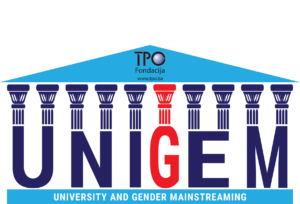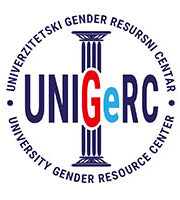Research Work
Through research work, the University Gender Resource Centre will encourage academic work in the vast interdisciplinary field that gender as a social concept implies.
When working on gender analysis and research in theory and everyday practice, modern methods will contribute to building knowledge in this field by reviewing existing implied concepts and proposing new understandings and solutions.
Research work should help to develop, above all, regional and domestic networks of experts on gender issues in diverse humanistic, social, scientific, and all other fields.
The purpose is to structurally develop gender research, address gender epistemology, develop gender interdisciplinary knowledge, and promote gender equality within the academic community.
CHALLENGES OF INTEGRATING GENDER EQUALITY IN THE UNIVERSITY COMMUNITY: AGAINST GENDER-BASED VIOLENCE
 This publication has emerged as a result of extensive research efforts within the five-year UNIGEM project initiated by the TPO Foundation from Sarajevo in 2021. The project’s objectives include networking universities in the region, exchanging expertise, promoting gender equality in higher education through the establishment of mechanisms (councils or centers), adopting gender action plans (GAPs), enriching curricula in the field of gender equality, and raising awareness among teaching staff and students through various forms of thematic education and training. These are the reasons why partnerships have been established with 18 universities (and as of this year, 19) from Bosnia and Herzegovina, Croatia, Serbia, and Montenegro. Towards the end of 2021, as the project’s inaugural activity, a comprehensive qualitative and quantitative research was conducted at all 18 partner universities. Credit goes to the multidisciplinary team of researchers from all four countries with expertise in sociology, gender studies, cultural studies, law, philosophy, and religion.
This publication has emerged as a result of extensive research efforts within the five-year UNIGEM project initiated by the TPO Foundation from Sarajevo in 2021. The project’s objectives include networking universities in the region, exchanging expertise, promoting gender equality in higher education through the establishment of mechanisms (councils or centers), adopting gender action plans (GAPs), enriching curricula in the field of gender equality, and raising awareness among teaching staff and students through various forms of thematic education and training. These are the reasons why partnerships have been established with 18 universities (and as of this year, 19) from Bosnia and Herzegovina, Croatia, Serbia, and Montenegro. Towards the end of 2021, as the project’s inaugural activity, a comprehensive qualitative and quantitative research was conducted at all 18 partner universities. Credit goes to the multidisciplinary team of researchers from all four countries with expertise in sociology, gender studies, cultural studies, law, philosophy, and religion.
The research team members included: Zilka Spahić Šiljak, Jasna Kovačević, Jasmina Husanović, Ajla Demiragić, Milena Karapetrović, Mirjana Dokmanović, Merima Jašarević, Lana Bobić, and Marija Tatar Anđelić. The survey was conducted by the CREDI agency from Sarajevo, with most interviews conducted by Zilka Spahić Šiljak and Lamija Subašić, in person with women from Bosnia and Herzegovina and online with women from Montenegro. In Croatia, Lana Bobić and Daria Glavan Šćulac conducted 12 interviews with women, while in Serbia, Zorica Mršević conducted interviews. Interviews with men in Bosnia and Herzegovina and Montenegro were conducted by Adnan Hasanbegović and Muhamed Velagić, in Croatia by Dario Čepo and Nebojša Zelić, and in Serbia by Dragan Stanojević, Zoran Krstić, and Vladimir Todorović. Remarkably, 80% of the interviewees are aware that their colleagues have experienced sexual and gender-based violence and/or discrimination. 75.8% of teachers in the region are unaware of whether procedures for sanctioning perpetrators have been initiated. 61% of the interviewees have experienced gender-based violence or sexual violence, and there is a lack of transparent and open communication about gender-based violence at universities.
The publication is available at the following link
MENSTRUAL AND GENDER ACTION (MENGA) RESEARCH
 The TPO Foundation, in collaboration with university researchers, will conduct research on menstrual poverty with female students in Bosnia and Herzegovina. The research will be carried out at eight state universities in Bosnia and Herzegovina. We aim to raise awareness in society on this issue and present the fundamental principles of gender-responsive budgeting and how it can be implemented in public policies and decision-making. The research will consist of an anonymous survey available online through social networks and the TPO Foundation’s website. The second part of the research will involve individual interviews with university students about menstrual poverty, myths, and misconceptions related to this topic, as well as their personal habits. The research results will be presented to university representatives and relevant government officials with the aim of introducing free hygiene products at state universities in Bosnia and Herzegovina and reducing the tax rates on these products.
The TPO Foundation, in collaboration with university researchers, will conduct research on menstrual poverty with female students in Bosnia and Herzegovina. The research will be carried out at eight state universities in Bosnia and Herzegovina. We aim to raise awareness in society on this issue and present the fundamental principles of gender-responsive budgeting and how it can be implemented in public policies and decision-making. The research will consist of an anonymous survey available online through social networks and the TPO Foundation’s website. The second part of the research will involve individual interviews with university students about menstrual poverty, myths, and misconceptions related to this topic, as well as their personal habits. The research results will be presented to university representatives and relevant government officials with the aim of introducing free hygiene products at state universities in Bosnia and Herzegovina and reducing the tax rates on these products.


